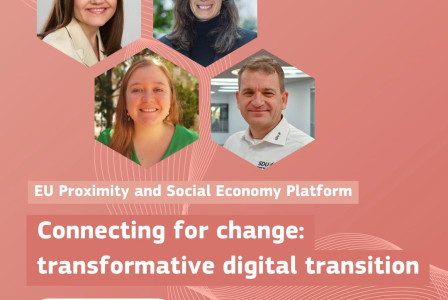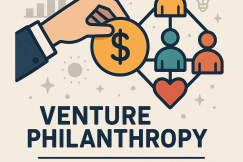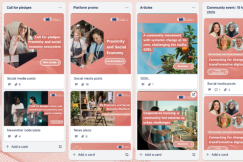Articles
13 June 2025
Connecting for Change: Transformative Digital Transition Second Technical Session
Articles
13 June 2025
Transformative Digital Transition
Proximity and social economy
Digital
+13 more
-
30

The second technical session for the project ‘Transition pathway stakeholder support platform: implementation for the proximity and social economy ecosystem’, titled ‘Connecting for Change: Transformative Digital Transition’ was held on 19 May 2025 online.
EURICSE
Topics
Denmark
Finland
Portugal
Spain
Academic / Research and VET Institutions
Business Support Organisation
Company with 250 or more employees
Cluster Organisations
Consumer Organisations
Cultural and Heritage Organisations
Destination Management & Marketing Organisations
EU Institutions
Financial Institutions and Investors
Industry Associations and Chambers of Commerce
International Organisations
Local Authorities
Media / Journalist Organisations
National authorities
Networks and Federations / Confederations
NGOs / Non-profits
Notified Bodies
Regional Authorities
SMEs (a company with less than 250 employees)
Social Economy Entity
Trade Unions
Other
-
Thematic area
-
-
Transformative Digital Transition
-
-
Interlinkages with other sectors
-
-
Proximity and social economy
-
Digital
-
Health
-
-
Action areas and keywords
-
-
Access to technology
-
Boosting digital skills by - and in the social economy
-
Data Maturity and data driven business models
-
Digital social innovation
-
Housing
-
Tech for Good
-
-
Ecosystem focus
-
-
Proximity economy
-
Social economy
-
-
Scope of activity
-
-
International
-
Local/neighbourhood
-
National
-
Regional
-
Share
The event focused on the launch of the second in a series of technical sessions dedicated to information sharing and collaboration within the proximity and social economy ecosystem, and addressed the following objectives:
Further promoting the PSE Platform and engaging pledge takers and stakeholders based on their interests, as identified in the survey and reiterated during the first Annual Event.
Showcasing exceptional pledges and best practices through the ‘INSPIRE’ panel session.
Highlighting the contribution of selected Ambassadors to the Transition Pathways.
Establishing links with other transition pathways, fostering cross-sectoral synergies.
The second technical session focused on Transformative Digital Transition, specifically around how digitalisation, data strategies, and ethical data practices can drive positive change within the Proximity and Social Economy ecosystem. There was a special focus on the following action areas: Data sharing, data management and a code of conduct and Supporting Digital Social Innovation (DSI) & Tech for Good Entrepreneurship.
This technical session marked the second in a series of three thematic events organised for the Proximity and Social Economy (PSE) Platform. Focusing on Transformative Digital Transition strategies, the session showcased concrete practices in the domains of health, research and housing & homelessness.
Gianluca Pastorelli, President of Diesis Network welcomed participants and spoke about the Code of Conduct for data sharing in the social economy. He highlighted why the code had been created and highlighted the Social Economy values linked to data sharing. These include: democracy, life-centredness, trust, self-determination, inclusivity, equity, co-opetition and data sufficiency.
The ‘INSPIRE’ panel session highlighted 2 standout initiatives that exemplify transformative digital transition in practice. It featured two experts showcasing AI, robotics and open data practices at the intersection of the digital transition and the Proximity and Social Economy:
Kasper Hallenborg, University of Southern Denmark - Ethical use of AI and technology for good, with a focus on the implementation of AI in robotics and, in particular, healthcare
Irene Oliva, Project Manager, Associació Sant Joan de Déu Catalunya - Use of open data or digital social innovations - COMHOM project - (A Comprehensive Approach to Combating Homelessness through Monitoring, Evaluation, Data-Driven Solutions, and Digitalisation)
They spoke about the innovative solutions being applied within the aforementioned Digital Transition action areas, highlighting particular “ingredients” necessary for success (particular partnerships, capacities, enabling factors, funding...) as well as lessons learnt and future plans.
AI and Robotics in Healthcare at the Maersk Mc-Kinney Moller Institut
Kasper Hallenborg has been Head of Department at the Maersk Mc-Kinney Moller Institute since 2014 and has since then taken the Department through an exponential journey of expansion and growth. Kasper holds a master’s degree in computer system engineering and a Ph.D. in Software Engineering and his research interests are among others: Ambient Intelligence, Welfare Technologies, Telemedicine, Ambient Intelligence, and Interoperability. Inspiring examples that were highlighted included AI-powered Ultrasound Diagnostic Robot for Rheumatoid Arthritis (RA), Automated colorectal cancer screening using AI pills, as well as Robot bronchoscopists. Discussion revolved around how to ensure that Ethical concerns are maintained at the heart of such innovative medical developments and how to combat technology reticence in the field and ensure a holistic approach where a social entrepreneurial spirit is nurtured in higher education research centers.
Comprehensive approach to tackling homelessness, the COMHOM project
Irene Oliva Rodriguez is an applied economist with experience in policy-making and empirical evaluation in academic and international institutions. She is currently the Project Manager of COMHOM (A Comprehensive Approach to Combating Homelessness through Monitoring, Evaluation, Data-Driven Solutions, and Digitalisation) at Saint John of God Social Services Barcelona. The COMHOM project is a transformative, EU-funded initiative aimed at combating homelessness across Europe through data-driven solutions. Launched in January 2025 with funding from the European Social Fund (ESF), the project brings together a diverse consortium of partners, including Sant Joan de Déu Serveis Socials Barcelona (Spain), Value for Health CoLAB (Portugal), Metropolia University of Applied Sciences (Finland), and others.
COMHOM focuses on addressing the pressing social challenge of homelessness, which affects at least 895,000 individuals across Europe, including families, women, young people, migrants, and individuals in precarious employment. Despite progress in adopting rights-based and housing-led approaches, gaps in systematic monitoring and evaluation (M&E) frameworks have hindered the effectiveness of homelessness services.
The session concluded with a collective call to action to encourage a transformative digital transition: to bridge practice and policy through active participation, knowledge exchange, and shared responsibility. As we move forward, placing a special focus on data sharing, data management, and establishing a clear code of conduct, we lay the groundwork for a more trustworthy and effective digital ecosystem. At the same time, by supporting Digital Social Innovation and Tech for Good entrepreneurship, we empower communities and innovators to harness technology for meaningful, inclusive change. Let this be a call to action—for collaboration, ethical leadership, and a shared commitment to shaping a digital future that serves the public good.
Comments (0)
See also
Transformative Digital Transition Highlights June and July 2025
- Categories
- Proximity and social economy Agri-food Construction +62 more
The evolution of philanthropy: from traditional giving to Venture Philanthropy and Impact-Driven Investment
- Categories
- Partnerships Regenerative Green Transition Skills +68 more
From Pathway to Practice: a closing note from the EU PSE Platform editorial team
- Categories
- Partnerships Regenerative Green Transition Skills +68 more




